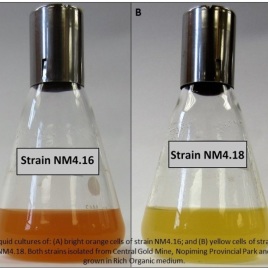Virus cells are incredibly efficient at delivering their cargo to the host cells, usually to the host’s detriment. But new research is attempting to utilize this viral trait for the better, by packaging salubrious things into conducive virus shells. Researchers copied the core protein shell of the Bluetongue virus using plant matter, which is a common way of avoiding contamination of the shell’s contents with human-made pathogens. The scientists then tested whether the plant-based shells can deliver other proteins to a human breast cancer cell, all within lab conditions. This nanotechnology could prove helpful in creating more targeted cancer treatments.
Authors:
Lou Brillault, Philippe V. Jutras,Noor Dashti, Eva C. Thuenemann, Garry Morgan, George P. Lomonossoff, Michael J. Landsberg, and Frank Sainsbury
Corresponding author:
Frank Sainsbury, University of Queensland, Australian Institute for Bioengineering and Nanotechnology, Email: f.sainsbury@uq.edu.au
Original paper published in ACS Nano on February 15, 2017.
